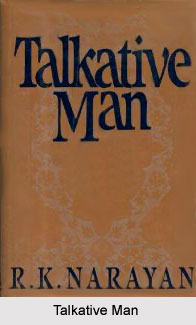 The central character in this story is the talkative man. Another important character is Dr. Rann who comes to the village with some wicked thoughts. But he could not succeed in his plans as he was caught by the talkative man. The story flows in a logical manner, which aptly echoes the meaning of the title with the nature of the protagonist.
The central character in this story is the talkative man. Another important character is Dr. Rann who comes to the village with some wicked thoughts. But he could not succeed in his plans as he was caught by the talkative man. The story flows in a logical manner, which aptly echoes the meaning of the title with the nature of the protagonist.
Reading R K Narayan`s piece of work gives an elemental pleasure in close succession. Narayan has villagers in his make-believe place Malguri. There he has tragic shopkeepers, ethical pickpockets, mean beggars, storytellers, anxious college students, and of course, "The Talkative Man." For Narayan, storytelling was deeply concerned with establishing a sense of community. The people should completely involved in each character. R K Narayan wrote only about Malgudi. By writing from deep within his small shrinking world, he came to acquire an instinctive understanding of it. To all readers of Narayan, as Graham Greene so aptly described, "Malgudi is a real place with which we have been as familiar as with our own birth place". Add to that the Kabir Street pyols, little temples, treadle printing presses, the Boardless Hotel, Gaffur`s taxi and the reading room, and you see the whole place pulsating with human activity of the kind that is memorable for its ordinariness.
R K Narayan believes to become ordinery in a extra-ordinery way. Malgudi is Narayan`s greatest invention wherein he could put in real people, real places in one harmony of day-to-day existence. Every minor and major character of R K Narayan`s stories fascinates the readers to its extent. One cannot fail to appreciate `the rainbow magnificence of life` in Narayan`s novels. It is the `miracle of faith` forged by the use of myth that is enacted in these novels. Despite the use of myth, it is the `credible universe` charged with `moral imagination` that comes to us in all the unforgettable novels written by the `grand old man of Malgudi`. There is no doubt that Malgudi will cast a spell and hold the future generations enthrall, long after some of the writers of this generation would have lost their audience.
Synopsis of Talkative Man, R K Narayan:
This story `Talkative Man` is also set up at the same backdrop of fictitious village Malgudi that R K Narayan has brought to life in an entire series of books. In this short novel a well-dressed but enigmatic stranger claiming to be from Timbuctoo takes advantage of a small-town journalist. The journalist is narrator for the story of Dr. Rann, who is apparently preparing a report for the U.N. on futurology. Talkative Man is a local journalist in Narayan`s fictional town of Malgudi. He meets an intended doctor from Timbuktoo who has supposedly come to the town on a mission for the United Nations. The talkative man has no real job and no visible means of support, but is a dashing dresser and elegant man. With that person all the locals are taken. As the story unfolds, it becomes clear that he is a womanizing predator who seduces young women and then abandons them without warning. The climax comes when Talkative Man attempts to prevent the doctor from seducing a young Malgudi woman whom Talkative Man has known since birth. The best feature of this book is Narayan`s delicate touch with characterization, sketching familiar types with just a few lines and that includes the old librarian and his wife, their granddaughter Girija, the agitated station master, the old porter, Varma who owns The Boardless Hotel, the Deputy Minister, and even the President of the Lotus Club.
The `Talkative Man` is published by Viking Adult, William Heinemann Ltd., Penguin Books Ltd., Indian Thought Publication, Heinemann,
The `Talkative Man` is a book where Narayan`s cheerful tale is written in a pleasant, easy to read style that is as accessible to teens as adults. It also adds some flavour of responsibility to the society. R. K. Narayan has once again become able to enthrall the readers by writing this story.



















